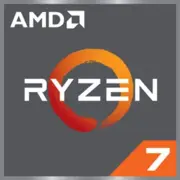AMD Ryzen 7 PRO 4750U

AMD Ryzen 7 PRO 4750U: Power and Efficiency in an Ultraportable Format
Analysis of the processor for those who value a balance between performance and battery life
1. Architecture and Process Technology: Why Renoir Became a Breakthrough
The AMD Ryzen 7 PRO 4750U, released in 2020, remains relevant in the budget segment due to its balanced architecture.
- 7nm TSMC FinFET Process Technology: This allows for the placement of 8 Zen 2 cores and a 7-core Vega 7 graphics accelerator on a compact chip. Frequencies range from 1.7 GHz (base) to 4.1 GHz (Turbo Boost), providing flexibility under loads.
- 8 cores and 16 threads: A rarity for mobile CPUs with a TDP of 15 watts. Multithreading is a key advantage here for rendering, video encoding, and virtualization tasks.
- Integrated Radeon Vega 7 Graphics: 7 compute units (448 stream processors) with a frequency of up to 1600 MHz. This is sufficient for Full HD gaming at low settings (e.g., CS:GO — 50-60 FPS).
The Zen 2 architecture is optimized for energy efficiency: the L3 cache has been increased to 8 MB, and the support for PCIe 3.0 (as opposed to PCIe 4.0 in Ryzen 5000) slightly limits the speed of storage devices, but this is not critical for office tasks.
2. TDP 15W: How AMD Balances Power and Battery Life
A TDP (Thermal Design Power) of 15 watts means that the processor is designed for thin laptops with passive or compact active cooling.
- Actual Power in Turbo Mode: Under peak load, the chip can temporarily consume up to 25 watts, but the cooling system quickly brings it back to nominal levels. This is important for short-term tasks, such as code compilation.
- Temperature Limits: In ultrabooks (e.g., Lenovo ThinkPad T14), the processor rarely exceeds 75°C, but in cheaper models with inadequate cooling, throttling may occur after 10-15 minutes of load.
The Precision Boost 2 technology dynamically adjusts frequencies, distributing the power load among cores. For example, in single-threaded tasks (such as web browsing), 1-2 cores operate at maximum frequency while others are turned off to save battery.
3. Performance: What Can Ryzen 7 PRO 4750U Achieve in 2025?
Despite its age, the chip shows respectable results:
- Office Work: Running 20+ tabs in Chrome, simultaneously working with Excel (spreadsheets with 100,000 rows), and Zoom — the processor handles this without lag.
- Multimedia: Converting 4K video in HandBrake (~25-30 minutes for a 10-minute clip), photo editing in Lightroom.
- Gaming: Vega 7 can run Fortnite at 720p/30 FPS, Dota 2 at 1080p/40-50 FPS. This is sufficient for less demanding games, but by 2025, this will be the minimum.
- Turbo Mode: In the Cinebench R23 benchmark, the chip scores 5207 points in multi-threaded mode (close to Intel Core i7-1260P), but after 3 minutes, the frequency drops from 4.1 GHz to 3.3 GHz due to heat.
For comparison, in Geekbench 6, Ryzen 7 PRO 4750U lags behind Apple M1 by 25% in single-threaded tests but surpasses it in multi-threaded tests (5207 vs 4800 points).
4. Use Cases: Who Is This Processor For?
- Students and Office Workers: Multitasking, long battery life (8-10 hours), portability.
- Freelancers: Rendering simple projects, working in Blender or Premiere Pro (with time limitations).
- Travelers: Laptops weighing from 1.3 kg (Acer Swift 3, HP ProBook 445 G7) with metal chassis and dust protection.
Not Suitable For:
- Gamers — a discrete graphics card is needed.
- Engineers — for work with AutoCAD or SolidWorks, it's better to opt for a CPU with a TDP of 45 watts.
5. Battery Life: How AMD Saves Battery Charge
Under moderate load (watching YouTube, office tasks), laptops with Ryzen 7 PRO 4750U can operate for 8-10 hours on a 50 Wh battery. Power-saving technologies include:
- AMD PowerNow!: Similar to Intel SpeedShift — switches frequencies in milliseconds.
- Adaptive Voltage Regulation: Reduces power consumption in idle states to 2-3 watts.
Tip: Disable Turbo Boost in Windows settings (via "Power Options") to extend runtime by 15-20%.
6. Comparison with Competitors
- Intel Core i7-1165G7 (Tiger Lake): Falls behind in multi-threading (4 cores/8 threads) but performs better in single-core (Geekbench 6 ~1450 points). Suitable for tasks focused on IPC, such as Photoshop.
- Apple M1: Better energy efficiency (up to 18 hours of battery life) but limited compatibility with Windows software.
- AMD Ryzen 5 5500U: A lower-end model with 6 cores. $100 cheaper but loses 15-20% performance in rendering.
Prices for laptops with Ryzen 7 PRO 4750U in 2025: $500-700 (new budget models, e.g., Lenovo IdeaPad 5).
7. Pros and Cons
Strengths:
- Best price-to-multithreading ratio.
- Support for virtualization technologies (AMD-V).
- Compatibility with Windows 10/11 and Linux.
Weaknesses:
- No PCIe 4.0 — SSDs operate at half speed.
- Weak graphics for modern gaming.
8. Laptop Selection Recommendations
- Device Type: Ultrabook or business laptop (HP EliteBook, Dell Latitude).
- Must-Have Specifications:
- 16 GB RAM (DDR4-3200).
- 512 GB NVMe SSD.
- IPS display with 1080p resolution.
- Cooling: 2 fans or copper heat pipes.
Examples of 2025 Models:
- Lenovo ThinkPad T14 Gen 2 ($650): Backlit keyboard, MIL-STD protection.
- ASUS ZenBook 14 UM425 ($600): 90 Hz display, weight 1.2 kg.
9. Final Verdict
AMD Ryzen 7 PRO 4750U is an ideal choice for those who need an affordable yet durable laptop for work and study. Its 8 cores handle multitasking well, and the 15W TDP ensures long-lasting battery life without recharging. However, for gaming or professional tasks, it’s advisable to consider more modern models. In 2025, this processor is a solid option in the price range of up to $700.
Basic
CPU Specifications
Memory Specifications
GPU Specifications
Miscellaneous
Benchmarks
Compared to Other CPU
Share in social media
Or Link To Us
<a href="https://cputronic.com/cpu/amd-ryzen-7-pro-4750u" target="_blank">AMD Ryzen 7 PRO 4750U</a>